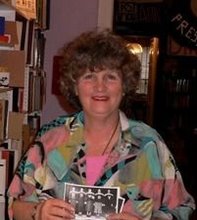
Daniel and I sat--you have already met him--he is my confidante, my pal, my techno teacher, his youth my bridge forward--together taking in the wonders of the human face when it is moved, when it is hopeful, when it is unfettered from ghettoes and niches, when it can see the past and the future as human ways, not edicts of power. We were watching the Democratic National Convention waiting to greet Barack Obama; my tears have not stopped flowing from when Kennedy marshaled all his strength to walk one last time to a political podium to usher in a new time--as a cancer survivor myself I knew what his thin white hair signaled--then Michelle Obama's speech, a new woman on the national scene speaking of her father and his weak but always loving hands --I know why we are told these stories but they are real lives and so much better then the cold blooded grin of Karl Rove--and then Hilary Clinton, a woman I have never warmed too but, boy oh boy, I did these last days. She rose above herself, the most when she stood next to David Patterson, surrounded by the New York delegation, calling for the unanimous nomination of the man who was putting the Clinton time in the past, how much I missed my city then, how proud I felt of that staunch group of New York faces. I know I am gushing, but for so long those of us who found ourselves, our deepest and in some ways bravest selves in the 1960s have listened for so long about the end of that time of social dreaming, the end of the visions of equality and collective possibilities. How often have I said, we were not all stoned, we were doing things! Marching across bridges and mountains to end the war, we faced the bayonets around the Pentagon and I was lucky enough to be one of the marchers out of Selma--the second time around--when hundreds of us passed over the Petty Bridge on our way to Montgomery. We have come back, in that Colorado gathering, 80,000 strong to hear a 47 year old man tell us America can lift its head again, out of the torture chambers and the corruption of K street, out of a war in which we are not even allowed to see the coffins of the dead, out of the sneers and arrogances of the Cheneys and Rumfelds, we can see higher and deeper into our shared humanity. Daniel, 32, and from a working class family in south Australia, and me, weeping into tissue after tissue, his 68 year old lost New York pal, sharing this time, Obama's words, the faces looking up at him, Daniel's hand reaching for mine to comfort, to hold this shard of time together in our intergenerational bond. I must return to New York if Obama wins, to this new land. Oh Paula, I was talking to you in my head, saying look at this girl, will you look at this!


